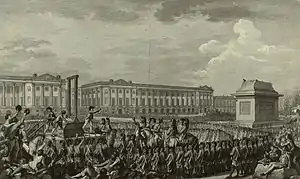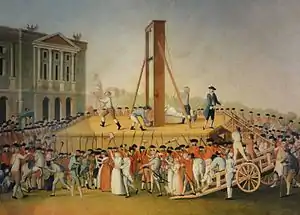1793 in France
| |||||
| Decades: |
| ||||
|---|---|---|---|---|---|
| See also: | Other events of 1793 History of France • Timeline • Years | ||||
Events from the year 1793 in France.
Incumbents
- The National Convention
- The Committee of Public Safety (de facto from 6 April)
Events
January to June
- 21 January – French Revolution: After being found guilty of treason by the French National Convention, Citizen Capet, Louis XVI of France, is guillotined in Paris.[1]

- 1 February – French Revolutionary Wars: The French First Republic declares war on Great Britain, the Dutch Republic and (soon afterwards) Spain.[2]
- 11 February – French expedition to Sardinia (Expédition de Sardaigne): A French fleet under admiral Laurent Truguet debarks troops near Cagliari in Sardinia.
- 22 February – French expedition to Sardinia: A small French and Corsican force briefly occupies the small Sardinian island of La Maddalena, then withdraws to Corsica. 23-year-old lieutenant Napoleon Buonaparte is second-in-command.
- 6 April – French Revolutionary Wars: The Committee of Public Safety is established in France, with Georges Danton as its head.
- 9 April – Edmond-Charles Genêt, France's new Minister to the United States, arrives at Charleston, South Carolina.[3]
- 25 May – French expedition to Sardinia: The last French troops occupying the small Sardinian island of San Pietro surrender to a Spanish fleet.
- 31 May – French Revolution: Regular troops under François Hanriot demand that the Girondins be expelled from the National Convention.
- 2 June – French Revolution: The Girondins are overthrown in France.
- 10 June – French Revolution: The Jardin des Plantes and the Muséum national d'histoire naturelle are created by the National Convention. The museum opens in Paris the following year, and the garden houses one of the first public zoos.
July to September
- 13 July – French Revolution: Charlotte Corday kills Jean-Paul Marat in his bath.
- 17 July – French Revolution: Charlotte Corday is executed.
- 10 August – French Revolution: Feast of Unity.
- Crowds in Paris burn monarchist emblems.
- The Louvre in Paris opens to the public as an art museum.
- 23 August – French Revolution: The following universal conscription decree is enacted in France: "The young men shall go to battle and the married men shall forge arms. The women shall make tents and clothes and shall serve in the hospitals; children shall tear rags into lint. The old men will be guided to the public places of the cities to kindle the courage of the young warriors and to preach the unity of the Republic and the hatred of kings."
- 5 September – French Revolution: The National Convention begins the 10-month Reign of Terror.
- 13 September – Battle of Méribel
- 17 September – The Army of the Eastern Pyrenees, one of the French Revolutionary armies, defeats a Spanish force at the Battle of Peyrestortes.
- 18 September-18 December – French Revolutionary Wars: Siege of Toulon – Admiral Hood's squadron of Royal Navy ships supporting French Royalists is forced to withdraw from Toulon after a successful siege by Napoleon, taking a number of French ships – including the Lutine – with them.[2]
- 20 September – British troops from Jamaica land on the island of Saint-Domingue to join the Haitian Revolution in opposition to the French Republic and its newly-freed slaves; on 22 September the main French naval base on the island surrenders peacefully to the Royal Navy.[4][5]
- 22 September – Battle of Truillas: Spanish forces defeat the French in the Pyrenees.
October to December
- 5 October – French Revolutionary Wars: Raid on Genoa – the Royal Navy boards and captures French warships sheltering in the neutral port of Genoa.
- 15–16 October – French Revolution: Battle of Wattignies – A French Republican force commanded by Jean-Baptiste Jourdan compels a Habsburg Austrian Coalition army to retire.
- 16 October – French Revolution: Marie Antoinette, the widowed queen consort of Louis XVI of France, is guillotined in the Place de la Révolution in Paris at the conclusion of a 2-day trial before the Revolutionary Tribunal.

October 16: Marie Antoinette's execution
- 24 October – French Revolution: The French Republican calendar is adopted by the National Convention.
- 10 November – The dechristianization of France during the French Revolution reaches a climax with the celebration of the Goddess of Reason in the cathedral of Notre Dame de Paris.
- 12 November – French Revolution: Jean Sylvain Bailly, the first Mayor of Paris, is guillotined.
- 8 December – French Revolution: Madame du Barry is guillotined.
- 18 December – French forces under Dugommier capture Toulon from royalists and British forces under Vice Admiral Lord Hood. The British fire the dockyards and take 16 ships, one of which, the Lutine, becomes a famous treasure ship.
- 23 December – War in the Vendée: Battle of Savenay – A Republican force decisively defeats the counterrevolutionary Catholic and Royal Army, ending the Virée de Galerne.
Births
- 18 July – Maria Caroline Gibert de Lametz, stage actress, later Princess Consort and regent de facto of Monaco
- 19 August – Barthélemy Thimonnier
Deaths
January to September
- 21 January – King Louis XVI of France (executed)
- 4 March – Louis Jean Marie de Bourbon, Duke of Penthièvre, admiral
- 13 July – Jean-Paul Marat, Swiss-born French Revolutionary leader (assassinated)
- 17 July – Charlotte Corday, assassin of Jean-Paul Marat (executed)
- 22 August – Louis de Noailles, French peer and Marshal of France
- 28 August – Adam Philippe, Comte de Custine, general (executed)
October
- 7 October – Antoine Joseph Gorsas, publicist, politician
- 9 October – Jean Joseph Marie Amiot, Jesuit missionary
- 16 October – Marie-Antoinette, Queen Consort of France (executed)[6]
- 31 October
- Pierre Victurnien Vergniaud, revolutionary leader (executed)
- Claude Fauchet, revolutionary leader (executed)
- Armand Gensonné, revolutionary leader (executed)
- Jacques Pierre Brissot, revolutionary leader (executed)
November
- 3 November – Olympe de Gouges, playwright (executed)
- 6 November – Louis Philippe II, Duke of Orléans, noble, revolutionary leader (executed)
- 8 November – Madame Roland, Revolutionary hostess (executed)
- 10 November – Jean-Marie Roland, vicomte de la Platière, revolutionary leader (suicide)
- 12 November – Jean Sylvain Bailly, astronomer
- 24 November – Clément Charles François de Laverdy, statesman (executed)
- 29 November – Antoine Barnave, revolutionary leader (executed)
December
- 4 December – Armand de Kersaint, revolutionary leader (executed)
- 5 December – Jean-Paul Rabaut Saint-Étienne revolutionary leader (executed)
- 7 December – Joseph Bara, French Revolution child-hero
- 8 December
- Étienne Clavière, financier, politician (suicide)
- Madame du Barry, courtesan (executed)
References
- "Louis XVI". Encyclopædia Britannica.
- Everett, Jason M., ed. (2006). "1793". The People's Chronology. Thomson Gale.
- Harper's Encyclopaedia of United States History from 458 A. D. to 1909, ed. by Benson John Lossing and, Woodrow Wilson (Harper & Brothers, 1910) p170
- Perry, James (2005). Arrogant Armies: Great Military Disasters and the Generals Behind Them. Edison: Castle Books. pp. 64–65.
- "British History Timeline". BBC History. Archived from the original on 2007-09-09. Retrieved 2007-09-04.
- "Marie-Antoinette | Facts, Biography, & French Revolution". Encyclopedia Britannica. Retrieved 22 March 2020.
This article is issued from Wikipedia. The text is licensed under Creative Commons - Attribution - Sharealike. Additional terms may apply for the media files.
.svg.png.webp)
%252C_rev%C3%AAtu_du_grand_costume_royal_en_1779_-_Google_Art_Project.jpg.webp)
